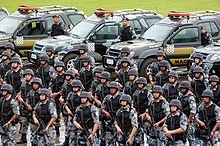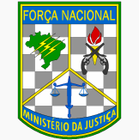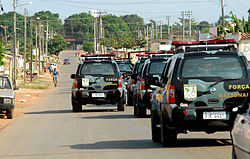- National Public Security Force
-
National Force of Public Safety
Força Nacional de Segurança PúblicaAbbreviation FNSP Badge of the National Force of Public Safety. Agency overview Formed 2004 Legal personality Governmental: Government agency Jurisdictional structure Federal agency Brazil General nature Operational structure Headquarters Brasília - Capital of Brazil. The National Public Security Force (Portuguese: Força Nacional de Segurança Pública), created in 2004, is a joint cooperation of various Brazilian Public Safety forces, co-ordinated by the National Secretariat of Public Safety (Portuguese: Secretaria Nacional de Segurança Pública - SENASP), of the Ministry of Justice. It is an agency that was created during the administration of President Luiz Inácio Lula da Silva, a concept developed by then Minister of Justice, Márcio Thomaz Bastos.
Contents
Command
The Secretary of the SENASP, Police Commissioner of the Brazilian Federal Police, Luiz Fernando Correa, is in overall charge of the Force, while the Colonel of the Military Police of Rio Grande do Sul, Aurélio Ferreira Rodrigues, has operational and direct control of the force.
Training
The National Force is composed by men of the Brazilian Military Police of the various states of Brazil, in coordination with the Secretary of public safety of each different Brazilian state.
Law enforcement officers receive initially 100 hours of further education, divided in ten days of training. They are classes in: human rights, control of civil riots, ostensive policing, crisis management and shooting techniques.
BEPE
The BEPE or Batalhão Especial de Pronto Emprego (Quick Deployment Special Battalion) is the elite unit of FNSP, is headquartered in Luziânia in the State of Goiás, and soon will also have another unit in the city of Rio de Janeiro. Its effective training with elite units of Brazil and abroad, is suitable to be used in patrolling or police special operations anywhere in the country, was established by the Ministry of Justice in order to become the leading and best-trained troops Brazilian police, and to act in emergency situations in public safety, when the law enforcement agencies state request federal intervention in an emergency. Urgency, that can be quickly answered, as his quota is effective and not demobilizable, remains in readiness to meet by Situation critical in public safety.
Performances
On different occasions, the National Force was called in the state of Espírito Santo as well as in the state of Mato Grosso do Sul, primarily to help containing rebellions inside prisons. On another occasion, the federal government offered to send the National Force to assist the state of São Paulo against acts of violence organized there, in 2006, again by prisoners against the state public safety forces, but the federal government offer was refused by the state government, as the state claimed control over the prisoners.
The governor of the state of Rio De Janeiro, Sérgio Cabral Filho asked for support from the National Force of Public Safety back in 2007 when the state suffered from a wave of attacks by several criminal factions. The Federal Government agreed to send a contingent of about 500 men and 52 vehicles to patrol 19 critical points within the state, mostly the favelas' areas.
Individual Weapons and Equipment


Agents of the National Public Security Force active in the Distrito Federal, and Luziânia.  Soldiers and Nissan Xterra vehicles of the National Public Security Force.
Soldiers and Nissan Xterra vehicles of the National Public Security Force.
- FAL and Para-FAL Assault rifle
- IMBEL MD97 Assault rifle
- IMBEL M1911 pistol Pistol
- Taurus PT92, Taurus PT100, PT24/7 Pistol
- Heckler & Koch MP5 Submachine gun
- Heckler & Koch UMP Submachine gun
Vehicles
See also
- Policing in Brazil
- Brazilian Federal Police
- Military police
- National Force
- Military of Brazil
- Brazilian Civil Police
- Batalhão de Operações Policiais Especiais
- Complexo do Alemão massacre
Law enforcement in South America Sovereign states Dependencies and
other territories- Aruba
- Bonaire
- Curaçao
- Falkland Islands
- French Guiana
- Law enforcement in Brazil
Federal State Civil Police Military Police Local See also Categories:- Law enforcement in Brazil
- Military police of the states of Brazil
- Gendarmerie
Wikimedia Foundation. 2010.


